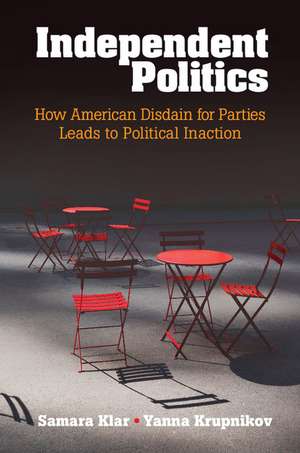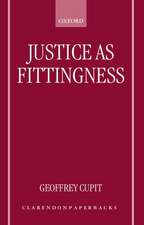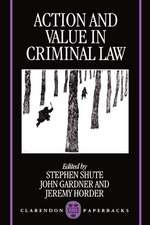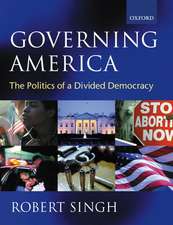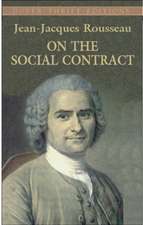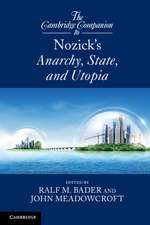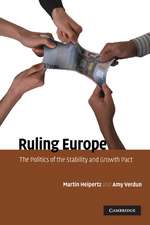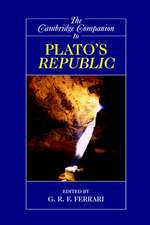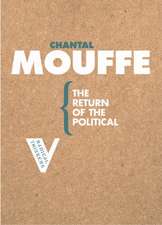Independent Politics: How American Disdain for Parties Leads to Political Inaction
Autor Samara Klar, Yanna Krupnikoven Limba Engleză Hardback – 20 ian 2016
| Toate formatele și edițiile | Preț | Express |
|---|---|---|
| Paperback (1) | 231.77 lei 6-8 săpt. | |
| Cambridge University Press – 18 ian 2016 | 231.77 lei 6-8 săpt. | |
| Hardback (1) | 690.11 lei 6-8 săpt. | |
| Cambridge University Press – 20 ian 2016 | 690.11 lei 6-8 săpt. |
Preț: 690.11 lei
Preț vechi: 775.40 lei
-11% Nou
Puncte Express: 1035
Preț estimativ în valută:
132.09€ • 138.78$ • 111.01£
132.09€ • 138.78$ • 111.01£
Carte tipărită la comandă
Livrare economică 11-25 martie
Preluare comenzi: 021 569.72.76
Specificații
ISBN-13: 9781107134461
ISBN-10: 1107134463
Pagini: 272
Ilustrații: 31 b/w illus. 10 tables
Dimensiuni: 152 x 238 x 17 mm
Greutate: 0.41 kg
Editura: Cambridge University Press
Colecția Cambridge University Press
Locul publicării:New York, United States
ISBN-10: 1107134463
Pagini: 272
Ilustrații: 31 b/w illus. 10 tables
Dimensiuni: 152 x 238 x 17 mm
Greutate: 0.41 kg
Editura: Cambridge University Press
Colecția Cambridge University Press
Locul publicării:New York, United States
Cuprins
1. Independents in name only; 2. Inside the mind of an independent voter in America; 3. How do you like me now? The desirability of political independence; 4. Everybody hates partisans; 5. Partisanship and political participation; 6. Undercover partisans in America; 7. Be careful what you wish for: political independents and partisan compromise; 8. The partisan underground in an era of polarization.
Recenzii
'Despite being aware of the existence of closeted partisans for quite some time, we know next to nothing about them: who they are, what motivates them to go undercover, the political and psychological conditions that increase their numbers, and how this affects American democracy. In Independent Politics, Klar and Krupnikov provide a fascinating and timely analysis of the psychological underpinnings of closeted partisanship. Using a combination of clever experiments and observational studies, the authors convincingly demonstrate that political disagreement leads many Americans - in particular those who are strongly attuned to social norms - to take a dim view of political parties, partisanship, and partisans. The political consequences of their analysis for democratic citizenship and political representation are far-reaching.' Howard Lavine, University of Minnesota
'The political science literature contains numerous claims about independents, most of which rest on a very thin bed of evidence. This book tells us as much about today's independents as the extant literature combined. It is a must-read for anyone interested in American public opinion and elections.' Morris Fiorina, Stanford University, California
'Klar and Krupnikov show, through a series of clever experiments, that although independents may vote like partisans, their disdain for parties leads them to go 'undercover', and avoid all manner of expressive political behaviors. Independent Politics is a fascinating read that makes a significant contribution to the subfields of political participation and political psychology. It will drive scholars to think about the decision to identify as independent in heretofore unrecognized ways.' Joanne Miller, University of Minnesota
'Klar and Krupnikov show that avoiding partisanship is a meaningful decision that has important implications for civic engagement. Using a variety of convincing tests, Independent Politics is a major work that will undoubtedly shape future research on partisan politics in the United States.' Stephen P. Nicholson, University of California, Merced
'… an excellent book. It lays out clearly a compelling theory and several key expectations, which are then tested with a series of clever experiments as well as observational evidence from the American National Election Studies … I should also add that while I highly recommend Independent Politics to scholars of public opinion and elections - and expect it will show up on graduate syllabi for such courses - I can also imagine it being used in an upper-division undergraduate course, given its lively and accessible language.' Judd Thornton, Public Opinion Quarterly
'The central finding of this book is that many independents identify as such because of concerns regarding how they will be perceived by others. In the minds of these voters, parties are increasingly seen as negative and embarrassing. To avoid being tainted with the stigma of partisanship, more and more voters are choosing to identify as independent. The book closes with a bracing examination of the possible implications of this development for American representative democracy … Highly recommended. Upper-division undergraduates through faculty.' M.D. Brewer, Choice
'The political science literature contains numerous claims about independents, most of which rest on a very thin bed of evidence. This book tells us as much about today's independents as the extant literature combined. It is a must-read for anyone interested in American public opinion and elections.' Morris Fiorina, Stanford University, California
'Klar and Krupnikov show, through a series of clever experiments, that although independents may vote like partisans, their disdain for parties leads them to go 'undercover', and avoid all manner of expressive political behaviors. Independent Politics is a fascinating read that makes a significant contribution to the subfields of political participation and political psychology. It will drive scholars to think about the decision to identify as independent in heretofore unrecognized ways.' Joanne Miller, University of Minnesota
'Klar and Krupnikov show that avoiding partisanship is a meaningful decision that has important implications for civic engagement. Using a variety of convincing tests, Independent Politics is a major work that will undoubtedly shape future research on partisan politics in the United States.' Stephen P. Nicholson, University of California, Merced
'… an excellent book. It lays out clearly a compelling theory and several key expectations, which are then tested with a series of clever experiments as well as observational evidence from the American National Election Studies … I should also add that while I highly recommend Independent Politics to scholars of public opinion and elections - and expect it will show up on graduate syllabi for such courses - I can also imagine it being used in an upper-division undergraduate course, given its lively and accessible language.' Judd Thornton, Public Opinion Quarterly
'The central finding of this book is that many independents identify as such because of concerns regarding how they will be perceived by others. In the minds of these voters, parties are increasingly seen as negative and embarrassing. To avoid being tainted with the stigma of partisanship, more and more voters are choosing to identify as independent. The book closes with a bracing examination of the possible implications of this development for American representative democracy … Highly recommended. Upper-division undergraduates through faculty.' M.D. Brewer, Choice
Notă biografică
Descriere
This book analyzes why combative politics stigmatizes Democrats and Republicans, thus Americans avoid political actions that could identify them as partisans.
